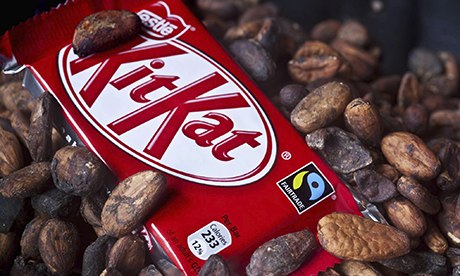
Kit Kats and Oreos will become healthier, the government will say on Saturday, announcing that the companies which make them have signed up to a "responsibility pledge" to cut the saturated fat the products contain. But the sugar levels in them will stay the same.
Days after the British Medical Journal ran an opinion piece from a cardiologist asserting that sugar and not saturated fat was the leading cause in the rise in heart disease and diabetes, the government announced the latest in its series of public health pledges with food manufacturers and supermarkets. This will, ministers said, remove the equivalent of one and a half Olympic-sized swimming pools full of saturated fat from the national diet.
"One in six male deaths and one in nine female deaths are from coronary heart disease – this is why it's critical that we challenge the way we eat and that we all make changes where we can," said the public health minister, Jane Ellison.
"It's hugely encouraging that companies providing almost half of the food available on the UK market have committed to this new responsibility deal pledge and they are leading the way to give their customers healthier products and lower fat alternatives."
Tesco said it will take 32 tonnes of fat out of its breadsticks and other products – while Morrisons promised to reformulate its own-brand range of spreads to take out some of the saturated fats, amounting to another 50 tonnes. Sainsbury's says it will continue work it has begun in cutting down the saturated fat in its products.
Mondelez – a separate company made up of the former snack arm of Kraft, the US multinational the owns Cadbury's – will reformulate products including belVita, Oreo and Barny biscuits.
Nestle is the biggest loser – with a pledge to take 3,800 tonnes of saturated fats out of its Kit Kats. Nestle says this is just a further step on the road to making its product more healthy. The firm stops short of suggesting Kit Kats might be classified one day as health foods, but adds that it had already lowered the salt content of the product.
"This is the next step on the journey where we are improving the nutritional profile of our products," said Ciaran Sullivan, managing director of Nestle Confectionery. "Kit Kat is our biggest confectionery brand and therefore the obvious choice to identify a sat fat reduction.
"Improving the nutritional profile of Kit Kat does not come at the expense of quality and taste and consumers will continue to enjoy the same Kit Kat as they have for over 75 years."
Saturated fat was blamed for growing rates of heart disease and diabetes in the 1970s, following the landmark "seven countries" study by the American scientist Ancel Keys. However, the British physiologist John Yudkin disagreed with what became the conventional public health wisdom, arguing that the problem was sugar. Yudkin's cause has been taken up again in recent years, notably by the US paediatrician Robert Lustig, in his book Fat Chance: The Bitter Truth about Sugar.
Lustig and others argue that the low fat craze may have actually done harm to people's health, because food manufacturers add sugar into low fat products to compensate for the loss of taste and texture after the fats are removed.
Aseem Malhotra, the interventional cardiology specialist registrar who wrote the BMJ article and said he had advised his patients to eat butter instead of low fat spreads, was unimpressed by the food manufacturers' pledges. Saturated fat, at least in non-processed foods, is not harmful, he said, but sugar is.
"This is the food industry paying lip service to the government," he said. "The root cause of the obesity epidemic is the food environment and if the department of health is serious about tackling the problem, they should listen to the Academy of Medical Royal Colleges."
The academy's report, published this year, recommended a ban on fast food outlets near schools and on TV ads for food high in salt, sugar and fat before 9pm, as well as a tax on sugary drinks.
Nestle says that in reducing the saturated fat in a two-finger KitKat bar from 3.3g to 2.9g it will not raise the sugar content. "The saturated fat reduction in Kit Kat has been made by changing the oil that is used to make the wafer filling," said a spokesperson.
The sugar content of the popular chocolate remains the same. There are 10.4g of sugar in a two-finger bar, which is the equivalent of 49.5g per 100g of Kit Kat. In other words, a Kit Kat is half sugar.
Oreo biscuits contain a slightly smaller proportion of sugar, at 35g per 100g and 8.3g of saturated fat. Barny, a sponge biscuit containing chocolate, is also one third sugar – 9.6g in a 30g biscuit and 1.4g of saturated fat. A 12.5g belVita breakfast biscuit contains 0.5g of saturated fat and 2.5g of sugar.
Subway, another signatory to the pledge, is trying to tackle the sugar issue by substituting the biscuits and crisps in its Kids Pak meal deal with fruit and vegetables, which also has the desired effect of cutting the saturated fat by 70%.
Compass, the biggest provider of school meals, says it will promote healthier menus as well as reducing saturated fat.
The Faculty of Public Health (FPH) said the supermarket and manufacture pledges would not make enough of a difference.
Prof John Ashton, the FPH president, said: "At a time when public spending is under scrutiny, it costs the NHS £5bn a year to treat obesity. So it is a good thing that some companies are making food that has less saturated fat than before.
"They need to ensure that at the same time they lower the sugar and salt that they have used to make foods more tasty as a result of lowering the fat content".
• This article was amended on 1 May 2014 to clarify the status of Mondelez International.

